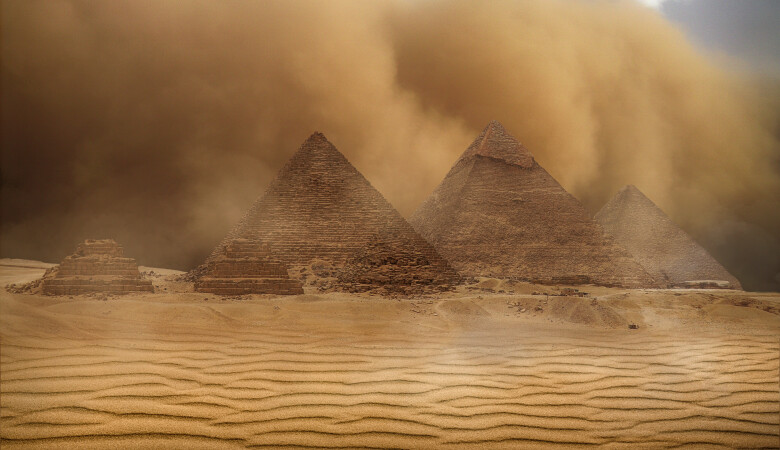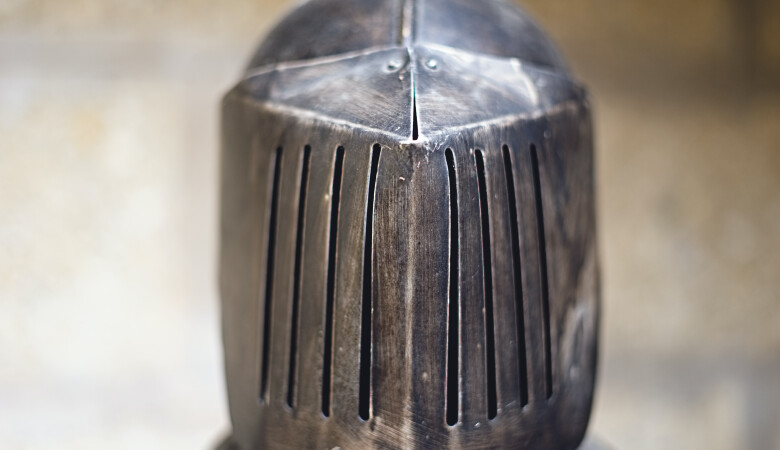God's Grace in Christ Makes Zion Glorious (Isaiah Sermon 63 of 80)
February 15, 2015 | Andy Davis
Isaiah 54:1-7
Zion, True Israel, Missions
Andy Davis preaches a verse-by-verse expository sermon on Isaiah 54:1-7. The main subject of the sermon is the expanding influence of the kingdom of God
- SERMON TRANSCRIPT -
When I was in seminary, one of the things they taught us when it comes to every passage of scripture is this phrase that we never forgot, that is context is king, but what that means is every passage of the Bible must be interpreted in context. We need to understand the context. So that would be the immediate linguistic context of the nouns and verbs and the sentence flow, and the paragraphs of that immediate chapter, and then stepping back a little bit bigger, how does that chapter fit into the overall flow of that particular book? We also want to ask questions of Israel's history, where... Especially in the Old Testament, where was Israel in its history, what was going on with the people of God, and at that point that the Scripture was written and what insights do we gain from that? So we can understand it. And then there's the picture of the whole biblical history and how does the New Testament give us any insights on this passage? For example, does a New Testament quote this passage? Does it use it in some way? Are there's some insights that we can gain from that? And then finally church history as we look at how Christians have understood the passage over time.
How have other Christians used it? Have there been famous sermons that have been preached from this passage or insights? And has God used it in an amazing way? And it's amazing, as we come to Isaiah 54, how vital questions of context are.
I want to start with just church history. This text, Isaiah 54, was the basis of one of the most famous and influential sermons in church history. On Wednesday, May 30th, 1792 at Friar Lane Baptist Chapel in Nottingham, England, William Carey put an incredible challenge into what came to be known as the Deathless Sermon, one of the most influential sermons in history. He, earlier that year, had written a little pamphlet, 1792, entitled: An Inquiry into the Obligations of Christians to Use Means for the Conversion of the Heathens.
What that meant was he was arguing that Christians need to figure out how to reach the lost, to the ends of the earth, and he was arguing against a view of the sovereignty of God that was so pervasive, that if God wanted to convert those heathen, he could do that on his own without us. And he's saying, "No, God is going to use us." And it was really, in many ways, the beginning of the modern Protestant missions movement, but this particular sermon was amazingly influential, and he preached it from Isaiah 54, 2-3, "Enlarge the place of your tent. Stretch your tent curtains wide, do not hold back. Lengthen your cords, strengthen your stakes, for you will spread out to the right and the left and your descendants will dispossess nations and settle in their desolate cities."
He preached it to a group of Baptist, fellow Baptists who were interested in missions, as he was, and he said that this text referred to the spread of the Gospel of Jesus Christ, and the building of the church of Jesus Christ through missions. He said the image of a once-barren woman, now giving birth to more children than she can count is a picture of the growth of the people of God. And the tent had to be enlarged, he said, because so many people would become sons and daughters of Abraham, through the spread of the gospel, that they wouldn't have room for him. And the whole sermon was boiled into two very famous applications. Number one, expect great things from God, and number two, attempt great things for God. Now, I'm not likely to do any better than William Carey did from Isaiah 54, but those are great applications. The slogan became a byword for the modern missionary movement. We should expect great things from God and missions. We should believe that God is going to do great things, that we need to have a big, expansive mindset. Enlarge the tent, get it ready, big things are happening. We ought to expect God to do great things.
And then, secondly, we should be involved ourselves. We should attempt great things for God when it comes to missions. Well, as a result of that Deathless Sermon, the Baptist Missionary Society was formed, and that was a society that would support Carey as he would soon go to Serampore, India to preach the Gospel and to begin an incredible work of missions there in India.
Now, how in the world did William Carey come to the conclusion that Isaiah 54:2-3 was talking about missions, talking about the church of Jesus Christ and the spread of the Gospel? It's an Old Testament prophecy and language that any Jew would have recognized as referring to Zion. Now, a bit of a disclaimer here, the word Zion doesn't appear in Isaiah 54, but it appears in Isaiah 52. And I think he's definitely... Isaiah's definitely predicting or prophesying about Zion. And that's the way I'm going to understand it. But how an Old Testament Jew would have said, this is about Zion, Jerusalem, the rebuilding of the city, and all that, the Jewish national capital, what right did William Carey have to think Isaiah 54 was talking about missions?
That brings me to the second question of context. And if you'd be willing, put your finger here, or whatever you do with your smartphone, or whatever you do for the Bible, and go over to Galatians chapter 4. For me, the interpretive key to Isaiah 54 is Galatians 4. You won't understand Isaiah 54 if you don't understand how the Apostle Paul quotes Isaiah 54 in Galatians 4. Remember that, in Galatians, some false teachers known as the Judaizers had come to Galatia, a gentile city, where Paul had planted a gentile church through faith in Christ. They were telling those gentile converts to Christ that unless they became Jews through circumcision and through the obedience to the laws of Moses, they could not be saved. They'd go to hell.
There were false teachers. And Paul wrote the whole Book of Galatians to refute that false doctrine and to teach justification by faith in Christ alone. You don't have to become a Jew, you don't have to be circumcised and keep the dietary laws, and all that. And he warned against these false teachers, these Judaizers. He assured these gentile converts to Christ they're already children of Abraham through faith in Jesus, they're already in the family of God. And then, in Galatians 4, he pulls out this amazing analogy or parable or allegory, or something like that, from the Old Testament story of Abraham and his wife Sarah, and their slave woman, Hagar. And you know that story from the Book of Genesis. And Paul just argues, by analogy, by allegory, or something like that, concerning what God is doing among the Gentiles.
Look what he says in Galatians 4:22-28, this is vital, we're not going to understand Isaiah 54, if we don't get this, I think. And in verse 22 of Galatians 4 it says, "It is written that Abraham had two sons, one by the slave woman and the other by the free woman. Now, his son by the slave woman was born in the ordinary way, but his son by the free woman was born as a result of the promise. Now, these things may be taken figuratively, for the women represent two covenants. One covenant is from Mount Sinai and bears children who are to be slaves. This is Hagar." Here's a key statement, Galatians 4:25, "Now Hagar stands for Mount Sinai in Arabia, and corresponds to the present City of Jerusalem because she is in slavery with her children. But the Jerusalem that is above is free and she is our mother. As it is written, 'Be glad, O barren woman who bears no children, break forth and cry aloud, you who have no labor pains, because more are the children of the desolate woman than of her who has a husband.'" That's Isaiah 54:1. "Now, you brothers, like Isaac, are children of the promise."
So, like Isaiah 54, Paul uses two metaphors, a woman giving birth and a city being built. He uses these two metaphors that are also found in Isaiah 54. We see these two coming together in Galatians 4:26, "The Jerusalem that's above is free and she is our mother." So that's strange, a city that's a mother, but that image is coming right from Isaiah 54, a city that's a mother. And that mother gives birth to supernatural children, not born in the ordinary way, but born by the power of God. Born by the power of the Spirit, not by the law, not by good works, not by obedience and self-effort, but born by the gospel, by the Spirit, by grace.
Every convert to Christ then is a child or a citizen, let's say, of the Jerusalem that's above this heavenly Zion, we could use that language, this heavenly Jerusalem. So the spread of the Gospel to the unreached people groups of the ends of the earth is a direct fulfillment of Isaiah 54:1, according to Paul. So Carey was right. It is about missions. It's about Gentiles coming to faith in Christ. Paul contrasts the present city of Jerusalem, the earthly, physical city in Palestine, that you can get a plane ticket to and fly to and land at, that physical city. They couldn't do all those things back then. You know what I'm talking about. Okay? But they could have traveled there, you could touch it, you could see it. That corresponded to Mount Sinai and to Hagar and to children born in slavery. That's what Paul says in Galatians 4.
But the Jerusalem that's above the new Jerusalem is our city, it's our home, it's our mother. It gives birth to children, all of that. And I would contend it's growing, it's getting bigger and bigger. The architect's plan is being fulfilled, and stones are getting put in place, and it's getting more and more glorious in every generation, every day, I would say. Every day, a little more glory is added to the heavenly Jerusalem, and how is that? By evangelism and by missions, by people coming to faith in Christ. And there is this heavenly Jerusalem that the Apostle John writes about in Revelation 21, in language that comes from Isaiah 54:13, from this very same chapter about this radiant city with walls and jewels and rubies, and all this beautiful stuff. That image just comes right from Isaiah 54. It says heavenly, heavenly Jerusalem.
And we are all like living stones quarried from Satan's dark kingdom, and transported, and put into these spiritual walls, and it's just rising and becoming glorious and beautiful, and it's a majestic story. So, if you're a Christian, you're already put in the walls of the New Jerusalem by faith in Christ. You're already there, you're already a living stone in that wall, and you'll never leave, you'll be protected and safe and secure, and it's just a glorious place. But not only are you a living stone, you're also called on to go on a commando raid mission with some of your brothers and sisters, go over to Satan's dark walls and get some more living stones out, because the city is not done yet, and that's awesome. Find your place in that story.
Alright. Thirdly, biblical historical context in the Old Testament for the Jews, for Israel, how would they have understood this? How would they have understood what's going on in Isaiah 54? Well, Isaiah 54 has in view the physical city of Jerusalem and its exile to Babylon, and the rebuilding of it. The disgrace of the exile is the backdrop for much of the chapter. You won't understand this chapter if you don't know why the exile happened, and the disgrace and the humiliation that was on Zion, the earthly city, because of the sins of the Jews. And so, in verses 1-5, Zion, though not mention, but that's who we have in mind here, Jerusalem, the city of God is pictured as a barren woman who never bore children for God. But now, by the grace of God, she's transformed, and she becomes an amazingly fruitful woman who has tons of children more than she knows where to put them all.
That's verse 1-5. Then, in verses 6-10, Zion is pictured as a rejected wife who's sent away in disgrace from her husband, but now she's called back, and she's restored to him in an eternal covenant of peace and security. And then, in verses 11-17, Zion is pictured as a destroyed city, but now rebuilt in beauty and security, with her enemies held at bay by the sovereign hand of God. So that's how the chapter unfolds here, God is promising here to rebuild Jerusalem and bring her exiles back. But as we've seen, again and again, the prophecies of restoration after the exile are much too glorious, they're much too grand to just be talking about the rebuilding of a physical city that would later get destroyed again by the Romans.
It's too glorious for that, too big, bigger things are happening, but that physical side was important, it was important to God's redemptive plan. So the work of Ezra and Nehemiah in rebuilding the temple, and the wall, and all that was important, even though someday all of that would get destroyed again, still important. So that's what he's saying, physical Jerusalem then is a type, a shadow, a picture, a prophecy of the New Jerusalem that's coming, and that type, that pattern was important, and it had to be rebuilt.
Fourth question of context. You're like, "Are you ever going to begin the sermon?" This is part of the sermon. Alright? This is all helpful. Alright? But the fourth question of context is where is this chapter in Isaiah, where are we in the unfolding story of Isaiah. And we're in a glorious place. We're in a absolutely majestically beautiful place. Isaiah 52:1 says, "Awake, awake, O Zion, clothe yourself with strength. Put on your garments of splendor, or Jerusalem." And then verse 3 of that same chapter, 52:3 says Zion will be redeemed. What does that mean? Bought back, bought out of slavery. Her punishment is paid for, it's been paid. How has it been paid? Isaiah 53, dear friends. Isaiah 53 is how it gets paid, that's how she gets redeemed. There's going to come one, a servant of the Lord, who will pay Zion price, pay her penalty, and who will die, as we've been seeing for three weeks, a glorious journey in Isaiah 53, of the Redeemer of Christ, who would come seven centuries later and pay the price for Zion, pay the price for the redemption. "He was pierced for our transgressions. He was crushed for our iniquities. The punishment that brought us peace was upon him, and by his wounds we are healed. We all, like sheep, have gone astray. Each of us has turned to his own way, and the Lord has laid on him the iniquity of us all." And then it is written, "It was the Lord’s will to crush him and cause him to suffer…" and then to rise... Raise him up from the dead. That's the payment price, that's the redemption in blood, in Jesus' blood. Now we go back to Zion, back to Zion, this glorious city, and big things are coming. Now that Jesus has come, and now that he's died, and now that he's risen again, and now he's ascended to heaven, get ready for some big things. It's going to get really, really big. Zion is going to get huge and glorious. That's the context.
And then, in chapter 55, which we'll go, God-willing, next time, we get this beautiful gospel invitation, "Come, all of you that are thirsty, come to the waters, and you who have no money, come buy and eat without money and without cost. Why spend yourselves on what doesn't satisfy in your labor, on what is not bread?" …Listen, listen to me, and eat what is good, and your soul will delight in the richest of fare." So that's where we're at here in Isaiah 54, a majestic picture of this heavenly Zion getting re... Getting built by the spread of the gospel, and this invitation coming to people to come, and to listen, and to believe.
I. Zion a Formerly Barren Woman, Now Supernaturally Fruitful (vs. 1-5)
Alright. So let's look at the chapter in detail in verses 1-5, Zion, there, pictured as a formerly-barren woman, but now supernaturally fruitful, "Sing, O barren woman. You who never bore a child, burst into song. Shout for joy, you who are never in labor, because more are the children of the desolate woman than of her who has a husband, says the Lord. Enlarge the place of your tent, stretch your tent curtains. Why, do not hold back, lengthen your cords, strengthen your stakes, for you will spread out to the right and to the left, your descendants will dispossess nations and settle in their desolate cities."
So we get here, at the beginning of the chapter, a series of sharp, joyful commands from a gracious God. God is going to do an amazing change, he'll work an amazing change for Zion, the children of God, the bride of Christ, the City of God. Whatever image we want to use here. The sovereign God is the dynamic actor here, he is the awesome change agent, and so he speaks powerful commands to Zion, and he tells her to sing, "Sing, O barren woman…" You're going to bear supernatural children. Zion, the city where God chose to put his name, and his glory cloud squandered their rich, spiritual heritage, wasted it. They wasted and squandered all of their rich spiritual blessings. They were spiritually-barren through idolatry and through their sins.
They didn't lead the surrounding Gentile peoples to a faith in the living God. They weren't a light for the Gentiles at that point, they failed in that mission. Instead, they were corrupted by the Gentile nations that surrounded them, they became idolaters just like them, and so they were spiritually barren. This Zion, this woman was spiritually barren, not bearing fruit for God. But now, that Christ has come, and now that Christ has died, and risen, the formally-barren lineage of Abraham and Sarah can bear children for the living God, so sing, and celebrate, and worship God for the streams of children that are going to be coming into this city, just celebrate, praise God.
Enlarge Your Tent! Get Ready for Tons of Children!
And enlarge your tent, get ready for lots of children. Get ready for lots of children. Look at verse 2, "Enlarge the place of your tent, and stretch your tent curtains wide. Do not hold back, lengthen your cords, and strengthen your stakes." So the tent image harkens back to the patriarchal era, Abraham, Isaac, Jacob, they lived in tents in Palestine, they traveled about in tents.
And if you're a barren couple, you need only a small tent, but if you're going to have a child, you might need a little bit bigger tent, and if you're going to have twins, you need an even bigger tent. Well, we're not talking twins here. I don't know what the word is for millions and millions and millions and millions of children, but we need a really, really expansive vision here, a really big tent with strong cords and strong stakes, and there's just... Big things are coming.
Well, how many? Well, it's going to be massive, it's going to be massive. Matter of fact, we need the whole Bible, and then church history to tell us just how big this is going to get. Revelation 7:9 says, "After this, I looked, and there before was a multitude from every tribe, language, and people, and nation, a multitude so great, no one could count them. Standing in front of the throne and the Lamb and saying, 'Salvation belongs to our God who sits on the throne and to the Lamb.'" In the world today, statistics say they are over 2 billion who would identify themselves, nominally, as Christians. We know that, in some countries of the world, maybe dominated by Roman Catholicism or Orthodoxy, there might be a dead nominal list of people who had claimed to be Christians because they're not atheists or Muslims, etcetera, but they're not... We wouldn't find them to be born again.
Recent years, missiologists have coined an expression, Great Commission Christians. We used to use the word evangelicals, people who know that you need to be born again, who know and understand the gospel of justification by faith alone, and they've trusted Christ. Missiologists tell us there are somewhere between 550 and 750 million of them in the world today, alive today. Now, we know, again, even, of them, maybe only a percentage of them, a high percentage but a percentage would be genuinely born again, but still half a billion to three quarters of a billion alive today.
"Enlarge the place of your tent, stretch your tent curtains wide…" and get big... It's going to get big, really big. And that's just the ones that are walking the earth today. What about all of those that have lived before us, who have died and gone on to be with the Lord. And he's not the God of the dead, but of the living, they are alive, they're up in the new Jerusalem now and they're glorious now. They're waiting for their resurrection bodies, but... They're absent from the body, but they're present with the Lord, they count too. How many tens of millions up there, we have no idea, this is huge. So even if you took that half a billion to three quarters of a billion number, and you tried to fit them in the physical city of Jerusalem, you're going to have a hard time.
Imagine the Jerusalem airport, imagine trying to get a hotel. Joseph and Mary had a hard time. You won't get a hotel. The most densely-populated city on the face of the Earth right now is Manila, 111,000 people per square mile. We're talking about 100 times as densely-populated if we all descended on physical Jerusalem, so we're not going there. Just go about your business, live your lives in your community. We don't need to go to a physical Jerusalem because the time for that is over. After the death and resurrection of Jesus Christ, and the outpouring of the Holy Spirit, Zion, the city of God is heavenly and constantly expanding through missions for 20 centuries, and it's huge.
You Will Expand and Displace Nations
Verse 3, "You will expand and displace nations. You'll spread out to the right and to the left. Your descendants will dispossess nations, and settle in their desolate cities." Now, the idea of physical Israel in the time of Ezra and Nehemiah doing this, perhaps, you could say, in some sense, taking over the Promised Land, but it would never be the same again. They were doing it by permission of the Medo-Persian emperors, and they certainly weren't going to be displacing the Meads or the Persians. And after the Persians fell to Alexander the Great, they weren't going to be displacing the Greeks. And after the Greeks fell to Rome, they certainly weren't going to be displacing the Romans. So verse 3 is spiritual, friends. It's spiritual, it's about missions. You're going to expand and displace, I would say, the satanic ideologies and the false gods, and all that. And you're going to take over places spiritually. We're not looking to own property here, we're going to inherit the Earth, and so we move, we travel lightly. We're like aliens and strangers, we're living in tents in our minds, but this spreading out and displacing neighbors is not military, that's not a physical conquest, it's the gospel.
The time of disgrace is over, in verse 4. We're done being disgraced. Zion is done, "Do not be afraid," he says, "You will forget the shame of your youth and remember no more the reproach of your widowhood." Now, in ancient times, one of the greatest disgraces for a married woman was to be childless. Even worse would be to be sent away by your husband, to be rejected by your own husband, and sent away, a great disgrace. These are images of disgrace, of shame, of sin. Jerusalem was called a whore by Isaiah the prophet in chapter 1:21. The faithful city has become a harlot. Why? Because of their idolatry, they're running after false gods and goddesses, the corruption of their souls. And so Hosea has an image of an unfaithful wife that he's got to go marry, and that's a picture of God's marriage to Israel, and how unfaithful she is.
But now that Christ has come, and now that Christ has shed his blood and redeemed her and bought her back, the time for her shame and disgrace is over. Anyone who trusts in him will never be put to shame. The time for shame is done. The reason for the change is the sovereign grace of God. Look at verse 5, "You will forget the shame of your youth and remember no more the reproach of your widowhood. For your Maker is your husband-- the LORD Almighty is his name-- the Holy One of Israel is your Redeemer; he is called the God of all the earth." That's why.
II. Zion a Formerly Rejected Wife, Now Restored in Covenant Love (vs. 5- 10)
And so, in verses 5-10, we have Zion, a formally-rejected wife, now restored in covenant love. The Lord will call you back as if you are a wife, deserted and distressed in spirit, a wife who married young, only to be rejected, says your God. Verse 7, "For a brief moment, I abandoned you, but with deep compassion I will bring you back. In a surge of anger, I hid my face from you for a moment, but with everlasting kindness, I will have compassion on you, says the Lord your redeemer."
This is a marvelous section here. God's names overwhelm this section, your maker, your husband, the Lord Almighty, the Holy One of Israel, your redeemer, the God of all the earth, six different names or functions of God, and they represent God's work in our lives. God is our maker, he knit us together, step by step, in our mothers' wombs. And each of the people who are going to populate the New Jerusalem eternally, God crafted them in that way, in their mother's womb. He is our maker. And God is our husband. The image of Zion as the bride of Christ is powerful, every marriage a mysterious picture of Christ in the church, the New Jerusalem. The Lord Almighty, that's another image, it's Yahweh of Hosts, the Lord of Hosts. The Lord... The commander of the heavenly army, he's powerful. So the head of his heavenly armies, Lord almighty, Lord of hosts. And the Holy One of Israel, God is the holy one. God is light, and in him, there's no darkness at all. He is pure. He hates wickedness. He hates sin. That's why they went into exile. He is the Holy One of Israel, and he is your redeemer. He's the one who paid the price to buy you out of bondage, paid the price to buy you and liberate you from sin.
He is the God of all the earth. What does that mean? He's not a tribal deity. He's not Israel's little God, little Israel's little god, that's not what he is. He's the God of all the earth, he sits enthroned above the circle of the Earth and its people. All nations are like grasshoppers and like dust on the scales, and dropped from the bucket. They're like nothing compared to him. He is the God of all the earth. That's why you're going to spread out to the ends of the earth and take this message, because all nations belong to him. This is the God who is freeing his people from shame. Now, Zion was like a wife rejected by her husband and sent away into exile because of her spiritual adultery and her idolatry. God sent her away into exile in Babylon for her sin, she was disgraced, shamed for her defilement, but God did this, he says, for just a brief moment. Look at verse 7-8, "For a brief moment, I abandoned you, but with deep compassion, I will bring you back. In a surge of anger, I hid my face from you for a moment, but with everlasting kindness, I will have compassion on you, says the Lord your Redeemer."
So God, in some way, abandoned Israel. In some way, he hid his face from her in the exile. But he says it was just a brief time, it was just a short time. Yeah, 70 years. Just know that God doesn't measure time the way you and I do. We say, for a brief moment, that's all, short time, I hid my face from you in anger, in a surge of anger, he says. Now, God disciplines his people for their sins, even now, even still. And I just want to step aside for a moment and just apply this to you. You may be actually in the middle of a brief surge of anger from God to you. It's not wrath, but it's a fatherly chastisement for your sins. You have violated your conscience in some way. You know what's going on, and God is afflicting you in some way, you may have an illness, you may have a diagnosis. By the way, not every diagnosis is because of known sins, but some are.
James 5 makes it plain. If we've sinned, that may be why we're sick, and we need to confess that and ask forgiveness. So it may be, not in every case, but may be. Could be you're having some kind of financial reversal, could be you're having some kind of stress in your family, perhaps some issue at work, something's afflicting you. But note the brevity of this. For a brief moment, in a surge of anger, just for a moment, God will discipline you. I like what it says in Psalm 30:4-5, "Sing to the Lord, you saints of his. Praise his holy name, for his anger lasts only a moment, but his favor lasts a lifetime. Weeping may remain for a night, but rejoicing comes in the morning." How sweet is that? So if you're under the chastising hand of God and you feel his rod on you, flee to him, embrace him, kiss the rod, kiss what he's doing, submit to it, learn your lesson, hate the sin that's caused it. If you don't know what it is, say, "Search me, O God, and know me, and show me what I'm doing wrong."
Ask him, ask him, and he'll show you. And then thoroughly repent of the sin, turn from it, and accept God's forgiveness and restoration, and just know this is just a brief time, and it'll pass. And that's a beautiful application. He says, "Just in a short time, I did this." Now, God is committed to bring Israel back and living as a faithful husband to her forever. He speaks of everlasting kindness and compassion in verse 8, as their Redeemer.
The Permanent Covenant
He speaks of a permanent covenant piece, and likens it to the days of Noah. Look at verse 9 and 10. "'To me, this is like the days of Noah, when I swore that the waters of Noah would never again cover the Earth. So now I sworn not to be angry with you, never to rebuke you again. Though the mountains be shaken and the hills be removed, yet, my unfailing love for you will not be shaken, nor my covenant of peace be removed,' says the Lord who has compassion on you."
So, this is just like God appearing to Noah after the waters of the flood had abated, and then that beautiful rainbow sign up in the sky. This is a sign, a pledge from me to you, and to the whole earth, I will never again destroy the earth with the waters of the flood, as I have done here. Never again. And he's kept that promise. So he's saying same thing for you, after the discipline, after the judgment, never again, I will never take my covenant love from you. So God will bring Zion through all the misery of this world, and put her in a place of total security, where she will live as a bride to her heavenly husband and perfect security forever.
The love of Christ for the church is more permanent than the mountains, ponder that. Though the mountains and the hills be removed, I will never remove my love from you. The Bible actually reveals they will be removed, every mountain and hill Revelation 6, will be removed, they're all going away. They look so permanent, don't they? They just look solid and permanent. I've seen the Himalayas. I've seen the Alps. I've seen the Pyrenees. I've seen the Karakoram mountains. I've seen some awesome mountains. I've seen the Rockies. I'd like to see more mountains. I love mountains. They seem so permanent. They seem so lofty, and majestic. They're temporary. God's love for you in Christ is eternal, that's what he's saying in this text.
God will marry Zion and live as a husband to her forever. This marriage image, Revelation 21:2, "I saw the holy city of the New Jerusalem coming down out of heaven from God as a bride beautifully dressed for her husband." More on that in a moment. Isaiah 54 pictures the day when all anger from God will be gone, and we'll live in total covenant security as the bride of Christ.
III. Zion a Formerly Destroyed City, Will Be Beautiful and Secure (vs. 11- 17)
Final section, verse 11-17, Zion, a formally-destroyed city, will be beautiful and secure. Verse 11 and 12, "O afflicted city, lashed by storms and not comforted, I will build you with stones of turquoise, your foundations with sapphires. I'll make your battlements of rubies, your gates of sparkling jewels, and all your walls of precious stones." So Jerusalem was an afflicted city, meaning humbled, poor, lowly, or debased. The city was said to be lashed by storms, and not comforted, referring to the attacks of wicked people, the persecutions and judgments that came from God on Jerusalem.
But then, as we expand it, talking about the heavenly Jerusalem, I think they go out to the afflictions and the tribulations and the troubles of God's people in this world until the glory comes. And there's afflictions and troubles and trials that are coming. God is committed to build this heavenly city, this heavenly Zion with costly stones, and lay... Adorn her foundations with sapphires, and her battlements, her pinnacles will be adorned with rubies, and her gates of sparkling jewels. It's going to be incredible beauty, incredible wealth. Exact same image as Revelation 10... Or Revelation 21, sorry, 10-14. Listen to this, Revelation 21, " And he carried me away in the Spirit to a mountain great and high, and showed me the Holy City, Jerusalem, coming down out of heaven from God. It shone with the glory of God, and its brilliance was like that of a very precious jewel, like a jasper, clear as crystal. It had a great, high wall with twelve gates, and with twelve angels at the gates. On the gates were written the names of the twelve tribes of Israel. There were three gates on the east, three on the north, three on the south and three on the west. The wall of the city had twelve foundations, and on them were the names of the twelve apostles of the Lamb."
So it represents the glories of the elect, the people of God, from Old Covenant, New Covenant, everyone there, glorious, radiant, shining with the glory of God. Ephesians 2 pictures the church like a living temple, being... Just rising up. A temple in which God lives and dwells by his spirit. And as I said, 1 Peter 2 pictures us like living stones, quarried out of Satan's dark kingdom and set in a wall to dwell forever. Living stones.
Isaiah 60 pictures the splendor of Zion, and the islands will look to God, and in the leaderships of Tarsus, bringing your sons from afar, with their silver and gold to the honor of the Lord your God, the Holy One of Israel, for he has endowed you with splendor, and foreigners will rebuild your walls, and their kings will serve you. And though, in anger, I struck you, in favor, I will show you compassion. Your gates will always stand open, they'll never be shut, day or night, so that men may bring you the wealth of the nations, their kings led in triumphal procession. And says there that Zion will be a place of knowledge of God and peace. Look at verse 13 and 14, "All your sons will be taught by the Lord and great will be your children's peace, and in righteousness, you will be established." These are the blessings of the Gospel. You're going to know God. They will all be taught by God, Jesus said.
No longer will a man teach his neighbor, or a man his brother, saying, "Know the Lord," but they'll all know me, from the least of them to the greatest. We'll have an intimate knowledge of God in heaven, perfect doctrine. And we'll be glorious, and it'll be a place of perfect security, we'll be at peace with God, great will be your children's peace, and great will be our righteousness.
The New Jerusalem Will Be Completely Secure!
And this new Jerusalem will be completely secure, verses 15-17, "If anyone does attack you, it will not be my doing. Whoever attacks, he will surrender to you. Behold, it is I who created the blacksmith who fans the coals into flame, and forges a weapon fit for its work. And it is I who have created the destroyer to wreak havoc." Verse 17, "No weapon forged against you will prevail. And you'll refute every tongue that accuses you. This is the heritage of the servants of the Lord, and this is their vindication from me, declares the Lord."
So if this is ultimately the church, Satan is concocting a whole bunch of weapons against you, as his church, concocting them every day. Flaming arrows to fire at us every day. God says they're all going to fail, all of them. You're going to make it through, you're going to be just fine. Actually, you going to be more than just fine. You're going to be radiantly glorious. No weapon forged against you will prevail. So this includes persecution by ISIS, persecution by secular governments, persecution by communist governments, and persecution by Islamic governments, and persecution by co-workers who aren't believers, and family members. No weapon forged against you will prevail. You're going to overcome, in all of these things, you're going to be more than a conqueror through him who loved us.
IV. Applications
So applications, before we go to the Lord's Supper, just see the connection between Isaiah 53 and 54. Isaiah 53 speaks of Jesus who shed his blood on the cross for sinners like you and me. 54 speaks of a glorious city where such redeemed people will live forever. Come into that city now. Come into the kingdom now by repentance and faith in Christ. Flee to Christ while there's still time. Flee to Christ now. Today is the day of salvation. Look to Christ crucified, his blood shed on the cross, as for you, that you were the sheep going astray, and now the Lord has laid on Christ your iniquities, by faith, find forgiveness in Christ.
Secondly, just if you're a believer in Christ, embrace the missionary thrust of this chapter that William Carey found. I don't think I can do any better than this. Expect God to do great things through FBC. Expect them. Expect God to use this church to take the gospel to the ends of the Earth, expect it. And put your expectations in your prayer life. Pray great things for this church. Pray that we would do greater things than we've ever done up till now in missions and evangelism. Pray for that. And then attempt great things for God. I love that word, attempt. It's like, "Huh? That sounds kind of uncertain." It is uncertain. You don't know how it's going to turn out, just do something for Christ. Be bold, take risks, share the gospel, attempt great things, and let God use your attempts to build his kingdom.
Let's reach out right here in the Durham area. On Wednesday night, we talked about embracing a new pattern of ministry to unreached people groups right here in the Triangle region. They're right here. And we chose to embrace the Gujarati people from India, they're an unreached people group that live right here. If you want to do unreached people group ministry without getting on a plane, you can do that. That's awesome. We've already got internationals coming on Wednesday nights, and they're getting ministered to every week. Get involved in that. And let's... Walter Lee shared with us our Global Priority Fund, our Global Missions Fund, Great Commission Fund. We are seeing a spike of giving in that every December, and then it drops off to kind of zero the rest of the year, until the summer, and then some giving comes up in connection with short-term mission trips. What do you say we level that out... Well, make it high, but level, all the way across? January giving, February, March, April, May... Sacrificial giving to missions. Why not? Let's expect great things for God, and attempt great things for God.
And then, finally, find your security in this, no weapon forged against you will prevail. Satan is throwing flaming darts at us all the time, and we live in a world in which ISIS is beheading people. Isn't it cool to know that a former beheader of Christians can become a Christian? Isn't that awesome? Pray for that. Pray that God would use the blood of martyrs as seed for the church. Now the time has come for Lord's Supper. I'd like to invite the deacons to come. And one application, as I close the sermon part in prayer, is, as we partake in the Lord's Supper, to look on it as a foretaste of the feast that we're going to enjoy in the new Jerusalem. Let's close the sermon in prayer.































